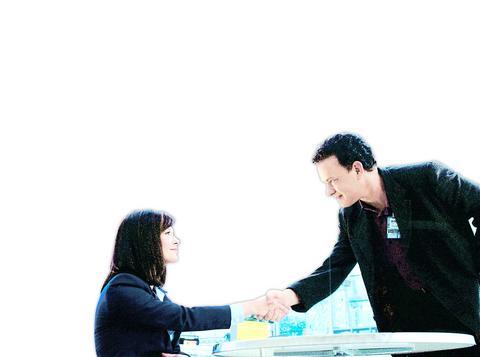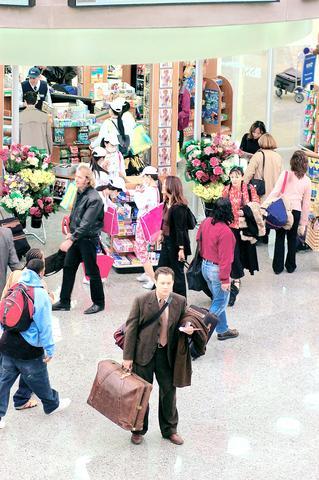An airline terminal is, by definition, a space you pass through on the way from one place to another, spending only as much time as is absolutely necessary. But the word terminal itself, which supplies the title for Steven Spielberg's new film opening today, also has some darker connotations that tug against its unassuming everyday meaning.
Its etymology -- termini were the local gods whose shrines served as boundary markers in the ancient Roman world -- suggests a frontier between worlds, while its modern medical usage associates the word with mortality. To be trapped indefinitely in a terminal, then, without recourse to either flight or ground transportation, can be imagined as a kind of living death, a nerve-racking state of perpetual limbo.

PHOTO COURTEST OF UNIVERSAL
Which makes it all the more remarkable that Spielberg has transformed this quintessential modern nightmare of interrupted air travel into a vision of earthly paradise. The director's lyrical view of flight was evident long before Catch Me if You Can, his soulful, finger-popping evocation of the golden age of commercial aviation: it could be glimpsed in the flashing spaceship lights at the end of Close Encounters; in the soaring bicycle of E.T., even in the Japanese fighter planes of 1941 and Empire of the Sun. (Tact forbids me from saying too much about Always.) The Terminal, at once following this preoccupation to its logical conclusion and (so to speak) flying in the face of it, is, improbably and enchantingly, about the romance of being stuck on the ground.

PHOTO COURTEST OF UNIVERSAL
Viktor Navorski (Tom Hanks), on a long-anticipated visit to New York from the imaginary Eastern European republic of Krakozia, arrives at J.F.K. just as a military coup abolishes his country's government and renders him effectively stateless. A complicated (and somewhat implausible) web of bureaucratic glitches and regulations strands him at the airport, where he remains for nearly a year, unable to board a flight home or hop a cab into Manhattan but innocent of anything that would warrant his detention. He is at once utterly trapped and completely at liberty. (His predicament is loosely based on the real experience of an Iranian traveler marooned for a much longer period in a Paris airport after the fall of the shah).
Spielberg and the screenwriters, Sacha Gervasi and Jeff Nathanson, emphasize freedom rather than constraint and focus on the lightness of Viktor's situation, rather than on its gravity. What sounds like a scenario out of Kafka or Gogol turns into a benign fairy tale of solidarity and resilience. The horror afflicting Victor's homeland is safely confined to cable news broadcasts on airport television monitors, and real-life traumas of loneliness and displacement melt away in the airy glass-and-steel volumes of the terminal.
The villain, since even the cheeriest fairy tale must have one, is an ambitious, humorless Homeland Security functionary named Frank Dixon, played with pursed lips and narrowed eyes by Stanley Tucci. Dixon, on the verge of a big promotion, regards Viktor not as a person in distress but as a procedural inconvenience. When his attempts to shoo Viktor into some other jurisdiction fail, his annoyance mutates into obsession, and he turns into a less sympathetic version of Hanratty, the monomanical Treasury Agent Hanks played in Catch Me if You Can.
In the serene comic world of "The Terminal," Dixon's vindictiveness is very much an anomaly. Before long, Viktor finds himself welcomed into an easy-going, multicultural tribe of nongovernmental airport employees, including a mischievous Indian custodian named Gupta (Kumar Pallana), a gruff baggage handler named Joe (Chi McBride) and a sweet-faced food-service worker named Enrique (Diego Luna).
In exchange for pilfered first-class meals, Viktor, with his balky English and cheery disposition, plays Cyrano for Enrique, who is smitten with Dolores (ZonSaldana), the immigration officer who performs the daily ritual of rejecting Viktor's application for permission to enter the United States. Viktor's own romantic longings are piqued by Amelia (Catherine Zeta-Jones), a flight attendant so used to being mistreated by the married men she dates that she has forgotten how to respond to genuine kindness.
It may strike you that some of the good feeling on display in The Terminal is pretty phony. The story, at times, is thin to the point of banality, and the filmmakers seem uncomfortable with characters who manifest anything more complicated than simple, quirky goodness.

Taiwan has next to no political engagement in Myanmar, either with the ruling military junta nor the dozens of armed groups who’ve in the last five years taken over around two-thirds of the nation’s territory in a sprawling, patchwork civil war. But early last month, the leader of one relatively minor Burmese revolutionary faction, General Nerdah Bomya, who is also an alleged war criminal, made a low key visit to Taipei, where he met with a member of President William Lai’s (賴清德) staff, a retired Taiwanese military official and several academics. “I feel like Taiwan is a good example of

March 2 to March 8 Gunfire rang out along the shore of the frontline island of Lieyu (烈嶼) on a foggy afternoon on March 7, 1987. By the time it was over, about 20 unarmed Vietnamese refugees — men, women, elderly and children — were dead. They were hastily buried, followed by decades of silence. Months later, opposition politicians and journalists tried to uncover what had happened, but conflicting accounts only deepened the confusion. One version suggested that government troops had mistakenly killed their own operatives attempting to return home from Vietnam. The military maintained that the

Before the last section of the round-the-island railway was electrified, one old blue train still chugged back and forth between Pingtung County’s Fangliao (枋寮) and Taitung (台東) stations once a day. It was so slow, was so hot (it had no air conditioning) and covered such a short distance, that the low fare still failed to attract many riders. This relic of the past was finally retired when the South Link Line was fully electrified on Dec. 23, 2020. A wave of nostalgia surrounded the termination of the Ordinary Train service, as these train carriages had been in use for decades

Lori Sepich smoked for years and sometimes skipped taking her blood pressure medicine. But she never thought she’d have a heart attack. The possibility “just wasn’t registering with me,” said the 64-year-old from Memphis, Tennessee, who suffered two of them 13 years apart. She’s far from alone. More than 60 million women in the US live with cardiovascular disease, which includes heart disease as well as stroke, heart failure and atrial fibrillation. And despite the myth that heart attacks mostly strike men, women are vulnerable too. Overall in the US, 1 in 5 women dies of cardiovascular disease each year, 37,000 of them